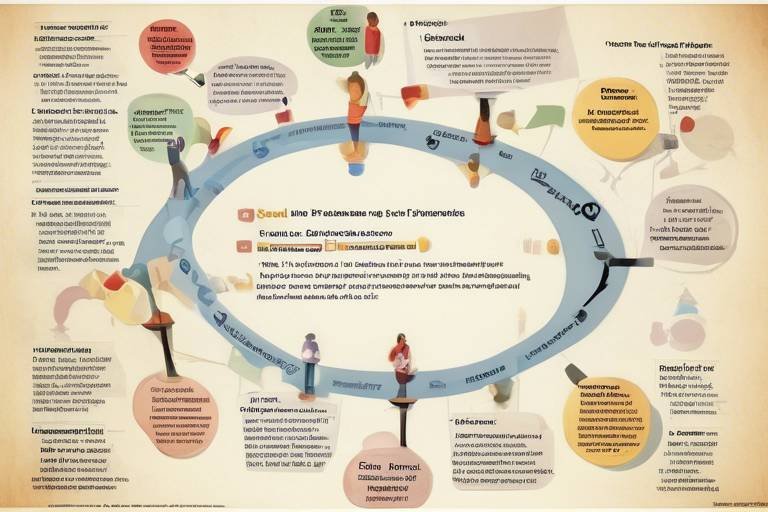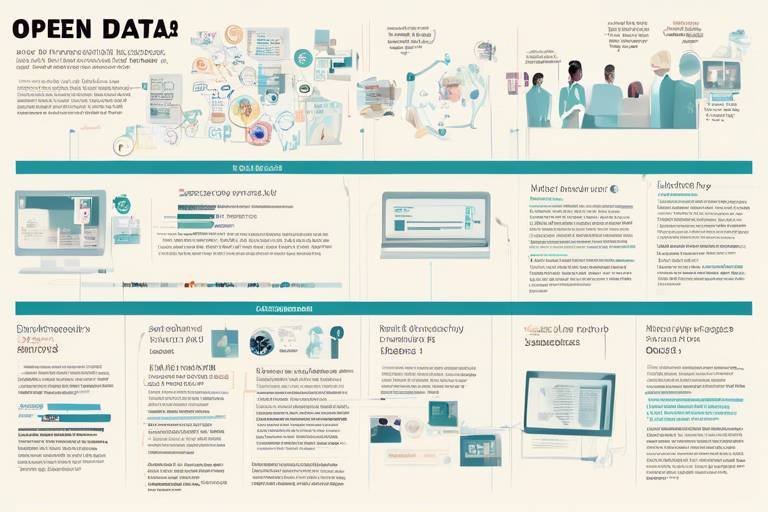The Science of Implementing Reflexivity in Research
Research is often perceived as a straightforward process of collecting data, analyzing it, and drawing conclusions. However, the reality is much more complex. One of the key concepts that can transform the way we think about research is reflexivity. This article delves into the concept of reflexivity in research, exploring its significance, methodologies, and the impact it has on the quality and integrity of research outcomes. By understanding reflexivity, researchers can not only enhance their work but also contribute to a more nuanced understanding of the subjects they study.
So, what exactly is reflexivity? At its core, reflexivity involves researchers reflecting on their own biases, beliefs, and influences throughout the research process. It’s about being aware of how personal experiences and societal contexts shape the research journey. Think of reflexivity as a mirror that researchers hold up to themselves, allowing them to examine their role in the research narrative. This self-awareness is crucial because it helps mitigate the risk of bias and enhances the credibility of the findings.
Reflexivity is not just a buzzword; it’s a vital component in the research landscape. Without it, researchers might unintentionally impose their perspectives onto participants or misinterpret data. By engaging in reflexivity, researchers can ensure that their work is not only more rigorous but also ethically sound. In a world where research can influence policy, public opinion, and individual lives, the importance of reflexivity cannot be overstated.
When it comes to qualitative research, reflexivity takes on an even more significant role. Qualitative research aims to understand the depth of human experience and the perspectives of participants. Here, reflexivity becomes a tool for researchers to connect with those experiences authentically. By acknowledging their biases and preconceptions, researchers can approach participants with an open mind, allowing for richer and more meaningful data collection.
To practice reflexivity effectively, researchers can employ various techniques. Two of the most common methods are journaling and peer debriefing. These techniques not only promote self-awareness but also enhance the overall quality of the research.
Journaling is a powerful tool for researchers. By maintaining a reflexive journal, researchers can document their thoughts, feelings, and reactions throughout the research process. This practice allows them to track how their perspectives evolve and how they might affect the research outcomes. The benefits of journaling include:
- Enhanced self-awareness
- Identification of biases
- Improved analytical skills
In essence, journaling provides a space for researchers to engage in critical self-reflection, which is essential for producing high-quality research.
Another effective technique is peer debriefing, where researchers engage with colleagues to discuss their findings and the research process. This interaction fosters reflexivity by exposing blind spots that researchers may not recognize on their own. It’s like having a trusted friend who can point out when you might be looking at things too narrowly. Peer debriefing contributes to a more comprehensive understanding of research findings and helps ensure that the conclusions drawn are well-grounded and reliable.
Despite the myriad benefits, implementing reflexivity can be challenging. Researchers might struggle with self-doubt or fear of judgment from peers, which can hinder their willingness to engage in self-reflection. Additionally, the time commitment required to maintain a reflexive journal or participate in peer debriefing sessions can be daunting. However, overcoming these challenges is crucial for the integrity of the research process. Strategies such as setting aside dedicated time for reflection and fostering a supportive research environment can help researchers navigate these obstacles.
While reflexivity is often associated with qualitative studies, it’s equally relevant in quantitative research. In fact, incorporating reflexivity into quantitative methodologies can enhance the rigor of the research. By recognizing how personal biases might influence data interpretation, researchers can strive for more objective results. This is particularly important in fields such as psychology, sociology, and public health, where data can have profound implications on policy and practice.
Reflexivity helps researchers identify and mitigate biases in quantitative studies. For instance, when designing a survey or experiment, researchers must be aware of how their assumptions can shape the questions they ask or the way they interpret results. By actively reflecting on these biases, they can employ methods that ensure more reliable and valid outcomes.
Finally, reflexivity has significant ethical implications. It encourages transparency and accountability, aligning closely with ethical research practices. Researchers who engage in reflexivity are more likely to recognize their responsibilities to participants and the broader community, ensuring that their work is conducted with integrity and respect.
1. What is reflexivity in research?
Reflexivity is the process of researchers reflecting on their own biases and influences during the research process, which helps enhance the credibility and integrity of their findings.
2. Why is reflexivity important in qualitative research?
In qualitative research, reflexivity is crucial for understanding participant perspectives and ensuring that researchers do not impose their own biases onto the data collected.
3. What techniques can researchers use to practice reflexivity?
Common techniques include journaling to document thoughts and feelings, and peer debriefing to gain feedback from colleagues, which can help expose blind spots.
4. Can reflexivity be applied in quantitative research?
Yes, reflexivity is relevant in quantitative research as it helps researchers identify and mitigate biases, leading to more reliable results.
5. How does reflexivity align with ethical research practices?
Reflexivity promotes transparency and accountability, ensuring that researchers recognize their responsibilities to participants and the integrity of their work.

Understanding Reflexivity
Reflexivity is a concept that has gained considerable traction in the field of research, acting as a mirror that reflects the researcher’s own biases, beliefs, and experiences throughout the research process. At its core, reflexivity is about self-awareness and critical reflection. It prompts researchers to pause and consider how their personal background, values, and assumptions might influence their study. This reflective practice is not just a nice-to-have; it is a fundamental component of rigorous research that enhances the quality and integrity of research outcomes.
Imagine you’re a chef creating a new recipe. If you only focus on the ingredients without considering your own taste preferences or the cultural significance of those ingredients, you might end up with a dish that doesn’t resonate with anyone. Similarly, in research, failing to account for one’s own biases can lead to skewed results that don’t accurately reflect the reality being studied. This is where reflexivity comes into play, acting as a safeguard against such pitfalls.
The importance of reflexivity cannot be overstated. It serves several critical functions:
- Enhances Credibility: By acknowledging their biases, researchers can lend credibility to their findings. This transparency builds trust with the audience.
- Improves Research Design: Reflexivity can lead to more thoughtful research questions and methodologies, as researchers become more aware of their influences.
- Encourages Ethical Considerations: Reflexive researchers are more likely to consider the ethical implications of their work, ensuring that their research is conducted responsibly.
In the ever-evolving landscape of research, reflexivity acts as a guiding principle that encourages researchers to engage deeply with their subject matter. It’s not merely a checkbox to tick off; it’s a continuous process that requires commitment and honesty. By fostering a culture of reflexivity, researchers can create more nuanced and comprehensive studies that truly reflect the complexities of human experience.
To further illustrate the significance of reflexivity, consider the following table that outlines the key aspects of reflexivity in research:
| Aspect | Description |
|---|---|
| Self-Reflection | The process of examining one’s own beliefs and biases. |
| Critical Thinking | Evaluating how personal perspectives shape research outcomes. |
| Transparency | Openly sharing the researcher’s role and influence in the study. |
| Ethical Awareness | Understanding the moral implications of research decisions. |
In summary, understanding reflexivity is essential for researchers who aspire to produce work that is not only valid but also ethically sound. It invites a deeper engagement with the research process, encouraging a dialogue between the researcher and their subject matter that ultimately enriches the entire field of study.

The Role of Reflexivity in Qualitative Research
Reflexivity plays a pivotal role in qualitative research, acting as a lens through which researchers can examine their own biases, assumptions, and influences throughout the investigative process. Unlike quantitative research, which often seeks to maintain objectivity, qualitative research embraces the subjective experiences of both the researcher and the participants. This approach allows for a richer understanding of the social phenomena being studied. By engaging in reflexivity, researchers can gain insight into how their personal backgrounds, perspectives, and interactions with participants shape the research outcomes.
One of the most significant advantages of incorporating reflexivity in qualitative research is that it enhances the depth and richness of the findings. When researchers reflect on their positionality—essentially, their social and cultural identities—they can better appreciate how these factors influence the data collection and analysis processes. For instance, a researcher from a particular cultural background may interpret a participant's responses differently than someone from another background. This understanding fosters a more nuanced analysis and interpretation of the data, leading to findings that are more representative of the participants' realities.
Moreover, reflexivity encourages researchers to consider the ethical implications of their work. When researchers are aware of their biases and how they may affect the research process, they can strive to minimize harm and ensure that their work is conducted with integrity. This self-awareness can lead to a more ethical approach to data collection and representation, ultimately enhancing the trustworthiness of the research outcomes.
To effectively implement reflexivity, researchers often utilize various techniques. For example, journaling allows researchers to document their thoughts, feelings, and reactions throughout the research process. This practice not only aids in self-reflection but also serves as a valuable tool for later analysis. Additionally, engaging in peer debriefing can provide researchers with new perspectives on their work. By discussing their experiences and challenges with peers, researchers can uncover blind spots in their understanding and enhance the overall quality of their research.
In summary, reflexivity in qualitative research is not just a methodological tool; it is a fundamental aspect that enriches the research experience and outcomes. By embracing reflexivity, researchers can cultivate a deeper understanding of their influence on the research process and contribute to more authentic representations of the participants' voices.
- What is reflexivity in qualitative research? Reflexivity refers to the process of researchers reflecting on their own biases and influences during the research process, which helps enhance the authenticity and depth of findings.
- Why is reflexivity important? It allows researchers to recognize how their backgrounds and perspectives shape their research, leading to more nuanced and ethical outcomes.
- How can researchers practice reflexivity? Techniques like journaling and peer debriefing are effective ways to cultivate reflexivity.

Reflexivity Techniques
When it comes to embracing reflexivity in research, there are several techniques that can significantly enhance a researcher's self-awareness and understanding of their positionality. These techniques are not just about jotting down thoughts; they are about creating a robust framework that allows researchers to critically engage with their own biases and influences throughout the research process. Two of the most effective methods are journaling and peer debriefing.
Journaling serves as a personal canvas where researchers can articulate their thoughts, feelings, and experiences during the research journey. Imagine a painter adding layers to a canvas; similarly, researchers build upon their reflections, creating a rich tapestry of insights that can inform their findings. By maintaining a reflexive journal, researchers can document their evolving thoughts, which can help them recognize patterns in their biases and assumptions. This technique not only promotes self-reflection but also encourages a deeper understanding of how personal experiences shape research outcomes.
On the other hand, peer debriefing is like having a trusted companion on a challenging hike. Engaging with peers for feedback can illuminate blind spots that researchers might overlook. Through discussions, researchers can gain alternative perspectives and insights that challenge their assumptions. This collaborative approach fosters an environment of transparency and accountability, crucial for ensuring the integrity of research findings. By sharing their experiences and reflections with peers, researchers can refine their methodologies and enhance the depth of their analysis.
Both techniques are instrumental in promoting a culture of reflexivity. However, it’s essential to recognize that implementing these techniques can come with challenges. Researchers may initially feel hesitant to share their vulnerabilities or may struggle with maintaining a consistent journaling practice. To overcome these obstacles, it's helpful to set aside dedicated time for journaling and to establish regular peer meetings. This commitment can lead to a more profound understanding of the research landscape and ultimately improve the quality of the research being conducted.
In conclusion, reflexivity techniques like journaling and peer debriefing are vital tools for researchers aiming to navigate the complexities of their biases and influences. By consciously engaging in these practices, researchers can enhance their self-awareness, leading to more reliable and insightful research outcomes.
- What is reflexivity in research? Reflexivity is the process of researchers reflecting on their own biases and influences during the research process, which helps improve the quality and integrity of their findings.
- Why is journaling important for reflexivity? Journaling allows researchers to document their thoughts and feelings, promoting greater self-awareness and understanding of how their experiences shape their research.
- How does peer debriefing enhance reflexivity? Peer debriefing provides an opportunity for researchers to receive feedback and alternative perspectives, helping to identify blind spots and improve the depth of their analysis.
- What challenges might researchers face when implementing reflexivity? Common challenges include hesitation to share vulnerabilities and difficulties in maintaining a consistent journaling practice. Setting dedicated time for these activities can help overcome these obstacles.

Journaling for Reflexivity
Journaling is more than just putting pen to paper; it's a powerful tool that can significantly enhance a researcher's reflexivity. By maintaining a reflexive journal, researchers can document their thoughts, feelings, and reactions throughout the research process. This practice not only serves as a personal archive of experiences but also acts as a mirror reflecting the biases and assumptions that may influence their work. Imagine trying to navigate a dense forest without a map; that's what conducting research without a reflexive journal feels like. It helps researchers chart their path, illuminating the shadows of their biases that might otherwise go unnoticed.
One of the key benefits of journaling is that it encourages a deeper level of self-awareness. When researchers regularly write about their experiences, they begin to recognize patterns in their thinking and emotional responses. For instance, if a researcher notices they are consistently frustrated when discussing certain topics, this reflection can lead to a critical examination of why that frustration exists. Is it a personal bias? A previous negative experience? By exploring these questions, researchers can refine their approach and ensure that their findings are not unduly influenced by personal feelings.
Moreover, journaling fosters a habit of critical reflection. It allows researchers to pause and consider how their background, beliefs, and experiences shape their interpretations and interactions with participants. This practice can be likened to polishing a diamond; the more one reflects and examines their thoughts, the clearer and more brilliant their understanding becomes. In this way, journaling not only enhances the quality of the research but also enriches the researcher's personal growth.
To maximize the effectiveness of journaling for reflexivity, researchers can incorporate specific techniques into their practice. For example, they can set aside dedicated time each week to reflect on their experiences, challenges, and insights. This routine creates a safe space for honest reflection, free from external pressures. Additionally, researchers can use prompts to guide their journaling sessions. Some effective prompts might include:
- What biases do I bring into this research?
- How have my interactions with participants influenced my findings?
- What emotions did I experience during my research, and why?
By answering these questions, researchers can deepen their understanding of their role within the research context and enhance the integrity of their work. Journaling for reflexivity is not just a method; it's a transformative journey that can lead to richer, more nuanced research outcomes.
Q: What is reflexivity in research?
A: Reflexivity is the process of reflecting on one's biases, influences, and assumptions during the research process to improve the quality and integrity of the research outcomes.
Q: How does journaling enhance reflexivity?
A: Journaling allows researchers to document their thoughts and feelings, promoting self-awareness and critical reflection on their biases and assumptions.
Q: What are some effective journaling techniques?
A: Researchers can set aside dedicated time for reflection, use prompts to guide their writing, and regularly review their entries to identify patterns in their thoughts and emotions.
Q: Can reflexivity be applied in quantitative research?
A: Yes, reflexivity is relevant in quantitative research as well, helping researchers identify and mitigate biases that may affect their results.

Peer Debriefing
Peer debriefing is an incredibly powerful tool in the realm of reflexivity, acting as a mirror that reflects the researcher's thoughts, biases, and interpretations back to them. Imagine standing in front of a mirror that not only shows your reflection but also highlights the areas you might overlook. This practice is essential for researchers who want to cultivate a deeper understanding of their work and its implications. By engaging with peers, researchers can discuss their findings and methodologies, allowing for a rich exchange of ideas that can illuminate blind spots in their perspectives.
During peer debriefing sessions, researchers can share their experiences, challenges, and insights, fostering an environment of collaboration and support. This not only helps in validating the research process but also encourages a critical examination of the assumptions that underlie their work. For instance, a researcher might present their initial findings, and through discussion, they might discover that their interpretations are influenced by personal biases or cultural backgrounds. This collaborative approach can lead to more nuanced and comprehensive research outcomes.
Furthermore, peer debriefing can take several forms, including informal discussions, structured meetings, or even online forums. The key is to create a safe space where honest feedback can flow freely. Here are some benefits of engaging in peer debriefing:
- Enhanced Self-Awareness: By receiving feedback, researchers can become more aware of their biases and assumptions.
- Diverse Perspectives: Peers can offer different viewpoints, enriching the researcher's understanding.
- Improved Rigor: The process can help refine methodologies and enhance the overall quality of the research.
- Accountability: Knowing that peers will review their work encourages researchers to maintain high standards.
In essence, peer debriefing is not just a supplementary activity; it is a fundamental component of the reflexive research process. By actively engaging with peers, researchers can ensure that their work is not only robust but also ethically sound. This practice ultimately leads to a more transparent and accountable research landscape, where findings are not just a product of individual effort but a collective endeavor.
Q1: What is the primary purpose of peer debriefing?
A1: The primary purpose of peer debriefing is to provide researchers with feedback on their work, helping them identify biases and assumptions, and enhancing the overall quality of their research.
Q2: How often should peer debriefing sessions occur?
A2: The frequency of peer debriefing sessions can vary based on the research timeline and needs, but regular check-ins throughout the research process are recommended to ensure ongoing reflection and improvement.
Q3: Can peer debriefing be done remotely?
A3: Yes, peer debriefing can effectively occur through online platforms, allowing researchers to connect and collaborate regardless of geographical barriers.
Q4: What types of feedback should researchers seek during peer debriefing?
A4: Researchers should seek constructive feedback on their methodologies, interpretations, and any potential biases, as well as suggestions for improvement and alternative perspectives.

Challenges of Reflexivity
Implementing reflexivity in research is not without its challenges. While the concept itself is crucial for enhancing the integrity and quality of research outcomes, researchers often find themselves grappling with various obstacles that can hinder the process. One major challenge is self-awareness. It can be incredibly difficult for researchers to recognize their own biases and preconceived notions. Imagine trying to look in a mirror while standing in a foggy room; that’s how it feels to sift through one’s own thoughts and beliefs. This lack of clarity can lead to a skewed understanding of the research context and participant perspectives.
Another significant hurdle is the time commitment required for reflexivity. Engaging in deep self-reflection and documenting thoughts through journaling or discussions with peers demands time that many researchers feel they simply do not have. In a world where deadlines loom large, the pressure to produce results can overshadow the need for introspection. This often results in reflexivity being sidelined, which can compromise the study's findings.
Moreover, the emotional toll of reflexivity cannot be overlooked. When researchers delve into their biases and influences, they may confront uncomfortable truths about themselves and their motivations. This process can be emotionally taxing, leading to feelings of vulnerability and self-doubt. Such emotional challenges can deter researchers from fully engaging in reflexive practices.
Additionally, there is the challenge of peer dynamics. While peer debriefing is a valuable technique for enhancing reflexivity, it can also introduce complexities. Not all research environments foster open dialogue, and some researchers may feel hesitant to share their reflections for fear of judgment or criticism. This reluctance can stifle honest conversations that are crucial for developing a comprehensive understanding of the research process.
To navigate these challenges, researchers can adopt several strategies:
- Creating a structured reflexivity plan can help allocate specific times for reflection, making it easier to integrate reflexivity into the research process.
- Building a supportive peer network encourages open dialogue and reduces feelings of isolation, making it easier to share and discuss reflexive insights.
- Practicing self-compassion allows researchers to acknowledge their biases and emotional responses without judgment, creating a safer space for reflection.
Ultimately, while the challenges of reflexivity may seem daunting, they are surmountable. By prioritizing reflexivity and actively working to address these obstacles, researchers can significantly enhance the depth and integrity of their studies. The journey of self-discovery may be fraught with challenges, but the rewards of clearer insights and more reliable outcomes are well worth the effort.
What is reflexivity in research?
Reflexivity refers to the process of researchers reflecting on their biases, influences, and the impact of their personal experiences on the research process. It involves a critical examination of how these factors shape the research findings.
Why is reflexivity important in qualitative research?
In qualitative research, reflexivity is essential for understanding participant perspectives. It helps researchers develop a deeper connection with their subjects, leading to richer and more nuanced findings.
What techniques can researchers use to practice reflexivity?
Common techniques include journaling, peer debriefing, and engaging in regular self-reflection. These practices encourage self-awareness and help researchers identify potential biases.
Are there challenges associated with implementing reflexivity?
Yes, challenges include difficulties in achieving self-awareness, the time commitment required, emotional tolls, and dynamics within peer relationships that can hinder open discussions.

Reflexivity in Quantitative Research
When we think of reflexivity, we often picture it nestled comfortably within the realm of qualitative research. However, reflexivity is not just a qualitative affair; it plays a pivotal role in quantitative research as well. In essence, reflexivity encourages researchers to critically examine their own assumptions, biases, and influences that could affect the outcomes of their studies. This self-awareness can significantly enhance the validity and reliability of quantitative findings, leading to more robust conclusions.
Quantitative research typically relies on numerical data and statistical analysis, which may give the impression that personal biases have little room to interfere. However, the reality is quite different. Researchers bring their own perspectives and experiences into the design, implementation, and interpretation of studies. By acknowledging these influences, researchers can better understand how their viewpoints shape the research questions they ask, the data they choose to collect, and how they interpret the results. This is where reflexivity becomes a game-changer, allowing for a more nuanced understanding of data.
One of the key aspects of incorporating reflexivity into quantitative research is recognizing and addressing bias. Bias can creep in at various stages of the research process, from the selection of participants to the interpretation of statistical results. For instance, if a researcher has a preconceived notion about a particular demographic, they may unconsciously skew their data collection methods or misinterpret findings in a way that supports their hypothesis. To combat this, researchers can implement several strategies:
- Pre-Study Reflection: Before embarking on a study, researchers should engage in self-reflection to identify potential biases.
- Collaborative Research: Working with a diverse team can help bring different perspectives to the table, reducing the likelihood of bias.
- Transparent Methodology: Clearly documenting research methods and decisions allows for scrutiny and helps others understand the context behind the findings.
Additionally, reflexivity encourages researchers to be transparent about their own positionality. This means openly discussing how their background, beliefs, and experiences may influence the research process. By doing so, they not only enhance the credibility of their work but also invite readers to critically engage with the findings. For example, a researcher studying educational outcomes might disclose their own educational background and experiences, providing context for their interpretations of the data.
Moreover, reflexivity can lead to richer data interpretation. When researchers are aware of their biases, they can approach data analysis with a more critical eye, questioning whether their findings genuinely reflect the reality of the participants or if they are merely a product of the researchers' own perspectives. This deeper level of analysis can uncover insights that might otherwise be overlooked.
In summary, reflexivity in quantitative research is not just a theoretical concept; it is a practical approach that can significantly enhance the quality of research outcomes. By acknowledging biases, being transparent about positionality, and engaging in self-reflection, researchers can ensure that their studies are not only rigorous but also ethically sound. As the field of research continues to evolve, embracing reflexivity will be essential for producing trustworthy and impactful results.
- What is reflexivity in research? Reflexivity is the process of researchers reflecting on their own biases and influences during the research process, which can affect the outcomes of their studies.
- Why is reflexivity important in quantitative research? Reflexivity helps researchers identify and mitigate biases, leading to more reliable results and a deeper understanding of the data.
- How can researchers practice reflexivity? Researchers can practice reflexivity through techniques such as pre-study reflection, collaborative research, and maintaining transparent methodologies.

Addressing Bias in Quantitative Studies
Bias in quantitative research can be a silent killer, lurking in the shadows and skewing results in ways that may not be immediately apparent. It's like trying to drive a car with a foggy windshield; you might get somewhere, but good luck seeing the road clearly! To truly understand how to address bias, we first need to recognize its various forms. Bias can stem from sampling methods, data collection techniques, or even the researchers' own predispositions. The key is to identify these biases early on, so they don’t derail the integrity of your findings.
One of the most effective strategies for addressing bias is through careful study design. This involves selecting a representative sample that accurately reflects the population being studied. If your sample is skewed, your results will be too. For instance, if you're conducting a survey on health behaviors but only include participants from a single demographic group, the data may not be generalizable. Additionally, employing random sampling techniques can greatly reduce selection bias, making your findings more robust.
Another critical aspect is the data collection process. Researchers must be vigilant about the tools and methods they use to gather data. For example, using leading questions in surveys can introduce response bias, where participants feel compelled to answer in a certain way. To mitigate this, questions should be neutrally phrased and tested for clarity before the study begins. Furthermore, employing multiple data collection methods, such as combining surveys with interviews, can provide a more comprehensive view and help counteract any biases that may arise from a single method.
Moreover, the importance of data analysis cannot be overstated. Researchers should utilize appropriate statistical techniques to identify and correct for biases. For instance, applying weighting techniques can help adjust the results to better reflect the target population. Additionally, sensitivity analyses can be conducted to determine how robust the results are to potential biases. This step is crucial, as it allows researchers to gauge the reliability of their findings and make informed decisions.
It's also essential to foster a culture of transparency and accountability within research teams. Encouraging open discussions about potential biases and the limitations of the study can create an environment where researchers feel comfortable addressing these issues. Peer reviews and collaborative discussions can unveil blind spots that individual researchers might overlook, ultimately leading to more reliable and valid outcomes.
In summary, addressing bias in quantitative studies requires a multifaceted approach that includes careful study design, rigorous data collection and analysis, and a commitment to transparency. By acknowledging and actively working to mitigate bias, researchers can enhance the credibility of their findings and contribute to the broader body of knowledge with integrity. Remember, in the quest for knowledge, clarity is key!
- What is bias in quantitative research? Bias refers to systematic errors that can distort research findings, leading to inaccurate conclusions.
- How can I reduce bias in my study? Employ random sampling, use neutral language in surveys, and conduct thorough data analysis to identify and correct biases.
- Why is transparency important in research? Transparency fosters trust and allows others to verify findings, enhancing the overall credibility of the research.
- What are some common types of bias? Common types include selection bias, response bias, and measurement bias.

Implications for Research Ethics
When we dive into the realm of research ethics, reflexivity emerges as a beacon of transparency and accountability. It's not just a buzzword; it’s a fundamental principle that can significantly shape the ethical landscape of any study. By engaging in reflexivity, researchers actively acknowledge their own biases and the potential impact these biases may have on their findings. This self-awareness is crucial because it fosters a culture of honesty and integrity in research practices.
Imagine you're on a journey through a dense forest. Reflexivity acts as your compass, guiding you through the thickets of personal and societal biases that could otherwise obscure your path. When researchers reflect on their positionality—how their background, beliefs, and experiences influence their work—they’re not just being introspective; they’re enhancing the credibility of their research. This practice ensures that the voices of participants are heard authentically, without being overshadowed by the researchers' preconceived notions.
Moreover, the implications of reflexivity extend beyond individual researchers. It impacts the broader research community by promoting ethical standards that prioritize respect for participants. When researchers commit to being reflexive, they are likely to consider the ethical dimensions of their work more thoroughly. They ponder questions like: Are my methods respectful to the participants? Am I potentially causing harm, even unintentionally? Such inquiries lead to more thoughtful and ethical research practices.
In addition, reflexivity can enhance the quality of data interpretation. When researchers are aware of their biases, they are better equipped to critically evaluate their findings and ensure that their conclusions are not skewed by personal perspectives. This leads to more reliable and valid results, which is a cornerstone of ethical research. In essence, reflexivity acts as a safeguard against the misuse of data, ensuring that research outcomes genuinely reflect the realities of the subjects studied.
To illustrate the importance of reflexivity in research ethics, consider the following table that outlines the key ethical implications:
| Aspect | Implication |
|---|---|
| Transparency | Reflexivity promotes openness about the researcher's influence on the study. |
| Accountability | Researchers take responsibility for their biases, leading to more ethical practices. |
| Respect for Participants | Reflexivity ensures participants' voices are prioritized and accurately represented. |
| Data Integrity | Awareness of biases enhances the validity of findings and interpretations. |
In conclusion, the implications of reflexivity for research ethics are profound and far-reaching. By integrating reflexivity into their practices, researchers not only enhance the quality of their work but also contribute to a more ethical and responsible research environment. This commitment to self-examination and critical reflection ultimately serves to uphold the dignity of research participants and the integrity of the research process itself.
- What is reflexivity in research? Reflexivity is the practice of researchers reflecting on their biases and influences throughout the research process.
- Why is reflexivity important for research ethics? It promotes transparency, accountability, and respect for participants, enhancing the integrity of research findings.
- How can researchers practice reflexivity? Techniques such as journaling and peer debriefing can help researchers become more aware of their biases.
- Does reflexivity apply to quantitative research? Yes, reflexivity is relevant in both qualitative and quantitative research, helping to identify and mitigate biases.
Frequently Asked Questions
- What is reflexivity in research?
Reflexivity in research refers to the process where researchers critically reflect on their own biases, influences, and experiences throughout the research process. It’s all about being aware of how your background and perspective can shape your findings.
- Why is reflexivity important in qualitative research?
In qualitative research, reflexivity is crucial because it helps researchers understand the perspectives of their participants more deeply. By reflecting on their own biases, researchers can enhance the richness of their findings and ensure that they accurately represent the voices of those being studied.
- What techniques can researchers use to practice reflexivity?
Researchers can utilize various techniques to practice reflexivity, such as journaling and peer debriefing. Journaling allows them to document their thoughts and feelings throughout the research journey, while peer debriefing provides an opportunity for feedback and exposes any blind spots they might have.
- How does journaling contribute to reflexivity?
Journaling is a powerful tool for reflexivity as it encourages researchers to articulate their thoughts and emotions during the research process. This practice fosters greater self-awareness and can lead to more thoughtful and nuanced interpretations of their data.
- What challenges do researchers face when implementing reflexivity?
Common challenges include a lack of time, discomfort with self-reflection, and the difficulty of being objective about one’s biases. To overcome these obstacles, researchers can set aside specific times for reflection and seek support from peers to create a more open environment for discussion.
- Can reflexivity be applied in quantitative research?
Absolutely! While reflexivity is often associated with qualitative studies, it is also relevant in quantitative research. By recognizing and addressing potential biases in their methodologies, researchers can enhance the reliability and validity of their quantitative findings.
- How does reflexivity impact research ethics?
Reflexivity has significant ethical implications as it promotes transparency and accountability in research practices. By being aware of their biases and influences, researchers can align their work with ethical standards, ensuring that their findings are trustworthy and ethically sound.



















